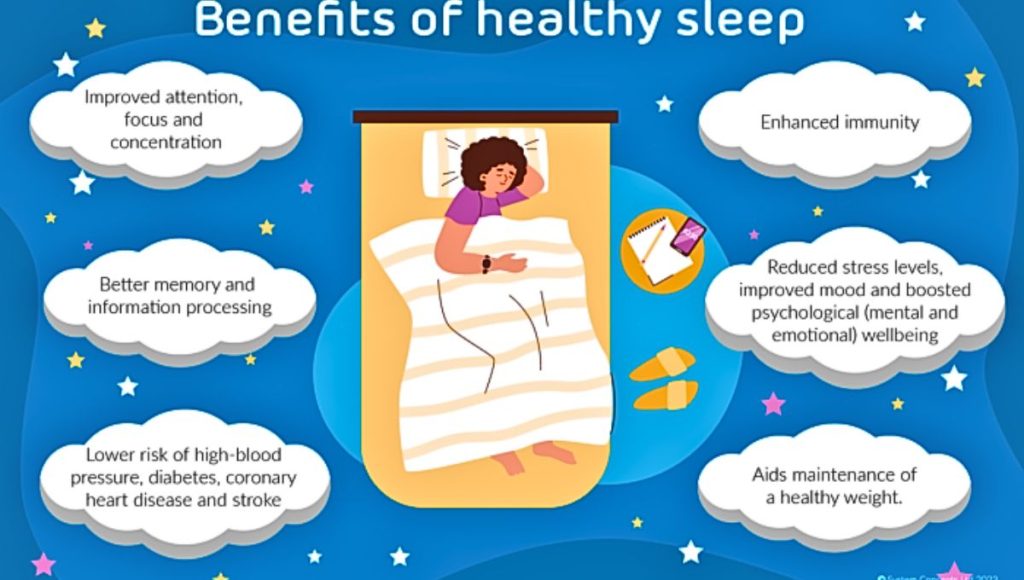Sleep is often overlooked in today’s fast-paced world, yet it is one of the most important pillars of health. A good night’s sleep is essential for mental clarity, physical well-being, and overall productivity. But why do we need sleep, and what happens when we don’t get enough?
Science has shown that sleep affects nearly every function of our body and mind. From improving cognitive function to boosting the immune system, quality sleep plays a crucial role in maintaining a healthy lifestyle. In this article, we will dive deep into the importance of sleep, its impact on health, and practical ways to improve sleep quality.

The Science Behind Sleep
What Happens When We Sleep?
While we rest, our body goes through multiple cycles of REM (Rapid Eye Movement) and non-REM sleep, each with distinct benefits.
- Non-REM Sleep: This stage consists of deep sleep, where the body repairs tissues, strengthens the immune system, and consolidates memories.
- REM Sleep: Known as the dream stage, REM sleep is vital for brain function, creativity, and emotional regulation.
Experts recommend 7-9 hours of sleep per night for optimal health. However, many people struggle to get adequate rest, leading to a host of health issues.
The Role of the Circadian Rhythm
Our sleep cycle is regulated by the circadian rhythm, an internal body clock influenced by light exposure and daily routines. When disrupted, it can cause sleep disorders, fatigue, and long-term health problems.
Tip: Exposing yourself to natural sunlight during the day and reducing blue light exposure at night can help regulate your circadian rhythm.
The Health Benefits of Quality Sleep
1. Boosts Brain Function and Memory
During sleep, the brain processes and consolidates information, improving memory retention and cognitive performance.
Research Insight: A study published in Nature Neuroscience found that individuals who had adequate sleep performed better on memory-related tasks than those who were sleep-deprived.
2. Strengthens the Immune System
A well-rested body produces higher levels of infection-fighting cells and antibodies, making it more resilient against illnesses.
✔️ Example: People who sleep less than 6 hours per night are more susceptible to colds and flu compared to those who get sufficient rest.
3. Enhances Emotional Well-being
Sleep and mental health are deeply connected. Poor sleep increases the risk of anxiety, depression, and mood swings.
Expert Insight: Dr. Matthew Walker, author of Why We Sleep, emphasizes that sleep deprivation can amplify emotional responses, making people more reactive to stress.
4. Aids in Weight Management
Lack of sleep affects hormones that regulate hunger, leading to increased cravings and overeating.
Fact: Studies show that sleep-deprived individuals consume more high-calorie foods and have a higher risk of obesity.
5. Supports Heart Health
Consistently good sleep lowers the risk of high blood pressure, stroke, and heart disease.
Did You Know? People who sleep fewer than 6 hours per night have a 48% higher risk of heart disease.
What Happens When You Don’t Get Enough Sleep?
Chronic sleep deprivation can lead to severe health consequences, including:
- Increased risk of chronic diseases (diabetes, heart disease, and obesity)
- Weakened immune system
- Cognitive decline and memory problems
- Higher levels of stress and anxiety
- Shortened lifespan
Shocking Statistic: Sleep deprivation is linked to a 33% higher risk of dementia in older adults.
Practical Tips for Better Sleep
1. Establish a Consistent Sleep Schedule
Going to bed and waking up at the same time every day helps regulate your internal clock.
Try this: Set a bedtime alarm to remind yourself to wind down.
2. Create a Relaxing Bedtime Routine
Engage in calming activities like reading, meditating, or taking a warm bath before bed.
Pro Tip: Avoid screens at least 30 minutes before bedtime to reduce blue light exposure.
3. Optimize Your Sleep Environment
Your bedroom should be cool, dark, and quiet to promote restful sleep.
- Use blackout curtains
- Invest in a comfortable mattress and pillow.
4. Watch Your Diet and Caffeine Intake
Avoid heavy meals, alcohol, and caffeine close to bedtime, as they can disrupt sleep.
Did You Know? Caffeine can stay in your system for up to 6 hours, so it’s best to avoid it in the afternoon.
5. Stay Active During the Day
Regular exercise improves sleep quality by reducing stress and anxiety.
Best Sleep-Boosting Workouts:
- Yoga
- Light cardio (walking, jogging)
- Strength training (avoid heavy workouts close to bedtime)
Famous Figures Who Prioritize Sleep
- Jeff Bezos: The Amazon founder attributes much of his success to getting 8 hours of sleep every night.
- LeBron James: The NBA star sleeps 8-10 hours per night, prioritizing rest for peak performance.
- Ariana Huffington: After experiencing burnout, she became an advocate for sleep, even writing the book The Sleep Revolution.
Final Thoughts
A good night’s sleep is not a luxury but a necessity. Prioritizing rest can boost your health, enhance productivity, and improve overall happiness.
- Sleep is vital for brain function, immunity, emotional well-being, and heart health.
- Poor sleep increases the risk of chronic diseases and cognitive decline.
- Simple habits like a consistent sleep schedule, proper diet, and a relaxing routine can improve sleep quality.
So, are you ready to transform your sleep and unlock your full potential? Start tonight!